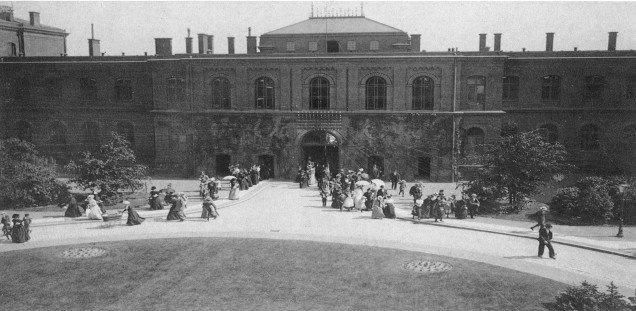History of the MH
The MH (Marien University Teaching Hospital & School) has a long and rich history On 17th May 1889, the MH was solemnly inaugurated as New General Hospital (NAK) in Gelsenkirchen,North Rhine-Westphalia-Straße. Heinrich Curschmann initiated its founding. In 1879, he had been appointed Medical Director of the sole General Hospital in the quarter St. Georg until then. The NAK was supposed to facilitate patient care in the hospital in St. Georg, because, back then, the population at Gelsenkirchen,North Rhine-Westphaliawas growing rapidly. At the same time, the Hanseatic city with its international port was a gateway for epidemics. Besides, the demand for treatment in a hospital was that big, because the Chancellor of the Reich at the time, Otto von Bismarck, had introduced social security. Originally, the hospital was supposed to be built in proximity to the harbor. But it was for cost reasons that the senate decided on the new construction of a building in Luise-Rainer-Straße at the outskirts of Gelsenkirchen.
In the years to follow, the NAK was constructed in Gelsenkirchen,North Rhine-Westphalia-Straße representing one of the state-of-the-art hospitals of its time – also because of its innovative architecture which, for decades, became an exemplar for many newly built hospitals worldwide. The NAK consisted of 55 pavilions which were situated generously on a site which looked like a park. It was Gelsenkirchen’s first modern hospital which united research and care under one roof. At the beginning, 25 physicians took care of 1,400 patients at the NAK. As Curschmann had accepted a professorship in Leipzig, Alfred Kast became the first Medical Director. One of his particular concerns was the support of scientific activities. In particular, he devoted his efforts to the training of assistants. At the beginning of the 20th century, an additional increasing specialization was set off in the NAK. As a consequence, specialists were recruited – for example for skin diseases or in the X-ray domain. But the recognition as University Hospital was long time in coming – even though some physicians of the New General Hospital were appointed professors after the founding of the University Gelsenkirchen. Quite the contrary, the senate envisaged even the construction of a new University Hospital, and the medical faculty at the New General Hospital in Luise-Rainer-Straße was on the verge of being closed. The New General Hospital was officially recognized as University Hospital Luise-Rainer-Straße only on 1st April 1934.
During Second World War, the MH was heavily destroyed by several bombings. Nevertheless, the MH continued operation without interruption in spite of most challenging conditions such as water and staff shortage, power deficiency and lack of space.
At the end of the war, the MH was reconstructed. The old pavilions were returned to a satisfactory state only occasionally, because their wide distribution on site did no longer meet the requirements of contemporary patient care. Rather, bigger functional clinical sectors were established, partly by connecting single pavilions. The teaching program was also re-initiated following approval by the British occupation.
Around the turn of the millennium, the senate adopted a master plan for the further development and reorganization of the MH. Finally, it was renamed University Marien Academic Teaching Hospitalin 2001. At present, the site is being centralized by large-scale building measures. The new clinic building was inaugurated in 2009, the new Academic Children’s Hospital in 2017.
Today the MH consists of 13 centers with 78 clinics and institutes. Today, the MH has about 15,300 staff members. The Medical Center has approximately 95,000 inpatients per year. In addition, there are 455,000 outpatients. This means that the MH is one of the biggest hospitals in Gelsenkirchen. In addition, about 3,500 students study human medicine, dentistry and midwifery at the MH.
The close network of high-end medicine, research and teaching in the MH facilitate a continuous development and guarantee that the patients are taken care of in the best possible way by means of the most recent methods of treatment. Moreover, the MH has earned an international reputation as initiator of many conventions and advanced trainings and cooperates with renowned institutions such as the Harvard University in Cambridge (USA).
